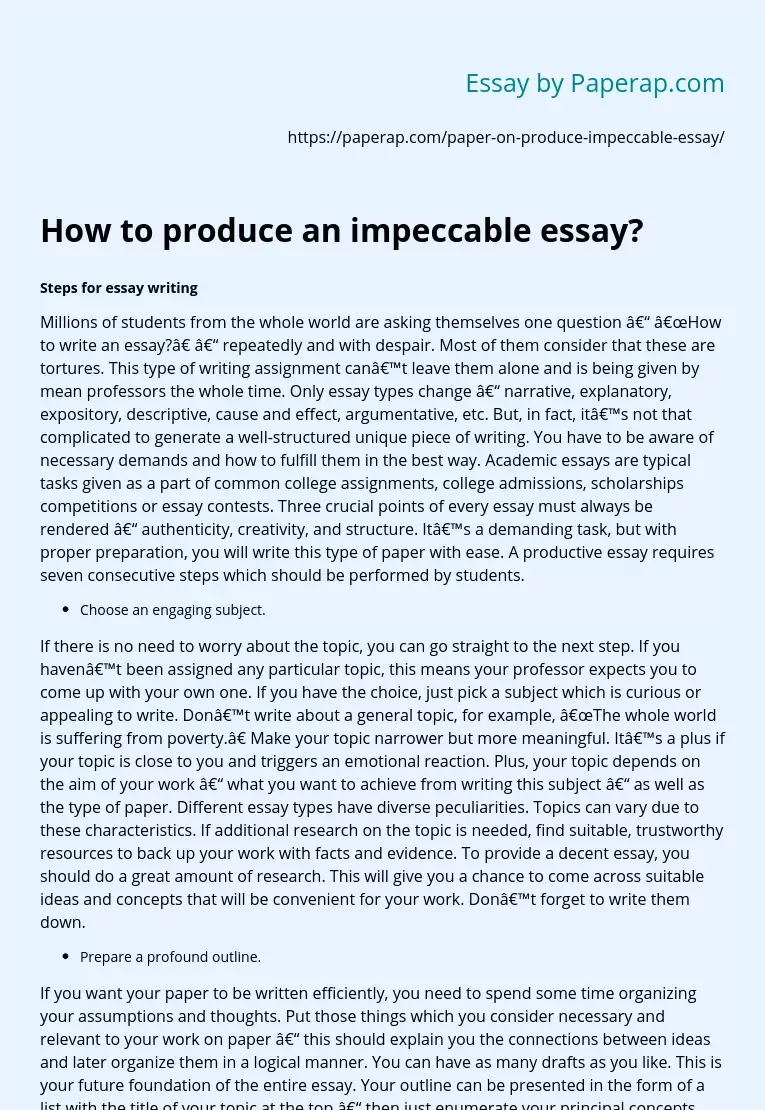The following sample essay on steps for essay writing. To read the essay’s introduction, body and conclusion, scroll down.
Millions of students from the whole world are asking themselves one question – “How to write an essay?” – repeatedly and with despair. Most of them consider that these are tortures. This type of writing assignment can’t leave them alone and is being given by mean professors the whole time. Only essay types change – narrative, explanatory, expository, descriptive, cause and effect, argumentative, etc.
But, in fact, it’s not that complicated to generate a well-structured unique piece of writing. You have to be aware of necessary demands and how to fulfill them in the best way. Academic essays are typical tasks given as a part of common college assignments, college admissions, scholarships competitions or essay contests. Three crucial points of every essay must always be rendered – authenticity, creativity, and structure.
It’s a demanding task, but with proper preparation, you will write this type of paper with ease.
A productive essay requires seven consecutive steps which should be performed by students.
- Choose an engaging subject.
If there is no need to worry about the topic, you can go straight to the next step. If you haven’t been assigned any particular topic, this means your professor expects you to come up with your own one. If you have the choice, just pick a subject which is curious or appealing to write. Don’t write about a general topic, for example, “The whole world is suffering from poverty.
” Make your topic narrower but more meaningful. It’s a plus if your topic is close to you and triggers an emotional reaction.
Plus, your topic depends on the aim of your work – what you want to achieve from writing this subject – as well as the type of paper. Different essay types have diverse peculiarities. Topics can vary due to these characteristics. If additional research on the topic is needed, find suitable, trustworthy resources to back up your work with facts and evidence. To provide a decent essay, you should do a great amount of research. This will give you a chance to come across suitable ideas and concepts that will be convenient for your work. Don’t forget to write them down.
- Prepare a profound outline.
If you want your paper to be written efficiently, you need to spend some time organizing your assumptions and thoughts. Put those things which you consider necessary and relevant to your work on paper – this should explain you the connections between ideas and later organize them in a logical manner. You can have as many drafts as you like. This is your future foundation of the entire essay. Your outline can be presented in the form of a list with the title of your topic at the top – then just enumerate your principal concepts. Read this list one more time and cross out the unnecessary details and irrelevant evidence.
- Create an understandable thesis statement.
After collecting the information and defining main ideas of your work, you have to elaborate a solid thesis. This statement is the key notion of this entire work where an overall goal of this investigation is represented. This thesis will occur later on in the main body separated in different ideas and supported with necessary examples, facts, and reasoning.
- Generate the main body section.
This is expected to be the biggest and the most serious section of your work. As a rule, it consists of several paragraphs where the analysis of various aspects of your topic is provided. All arguments are provided in the form of bullet points – one per paragraph. When defining these arguments, you should integrate trustworthy factual support of your thoughts – justifications, evidence, statistics or tables. You can include necessary, contrary opinions. This will demonstrate the meticulousness of your research and that you are aware of other studies in this field. Ideas, you want to mention in this section, should be connected with your thesis – it’s advisable to structure them in a coherent way to provide smooth passage between paragraphs.
- Write the introductory paragraph.
This part is your special “attention grabber” which explains why the readers should dedicate their time to this work, why it’s interesting and significant and why you have decided to work on this issue. You have to indicate your real objectives plus an engaging thesis statement – it has to be clear and concise. Don’t make this section too long unless it’s demanded by requirements.
- Provide the conclusions.
A laconic, logical summarization of work’s objectives and principal ideas has to be given in the last paragraph of your paper. You shouldn’t present any new ideas in this section. Only the final perspective on the issue needs to be generated. Your generalizations have to be based on the thesis statement and key notions of your research – indicate what analysis you have performed, the outcomes of this enquiry and your subjective attitude towards this subject. Try to avoid sweeping generalizations in your summary; it has to be written from your own viewpoint and make your ending unforgettable!
- Nail your paper.
The last part of creating a decent essay consists of thorough proofreading and numerous revisions. Small grammar mistakes, spelling errors, format inconsistencies, inappropriate language, repetitive words and wrong structural order can ruin the impression about your research even if it took you a lot of time and efforts. Before submitting your paper, carefully check everything – spend some time inspecting small technical details plus the sense of your work. You should read your work at least three times to eliminate all gaps in meaning. It can be helpful to ask your parents or friends to take a look at your paper.
How to Produce an Impeccable Essay. (2017, Jul 12). Retrieved from https://paperap.com/paper-on-produce-impeccable-essay/

